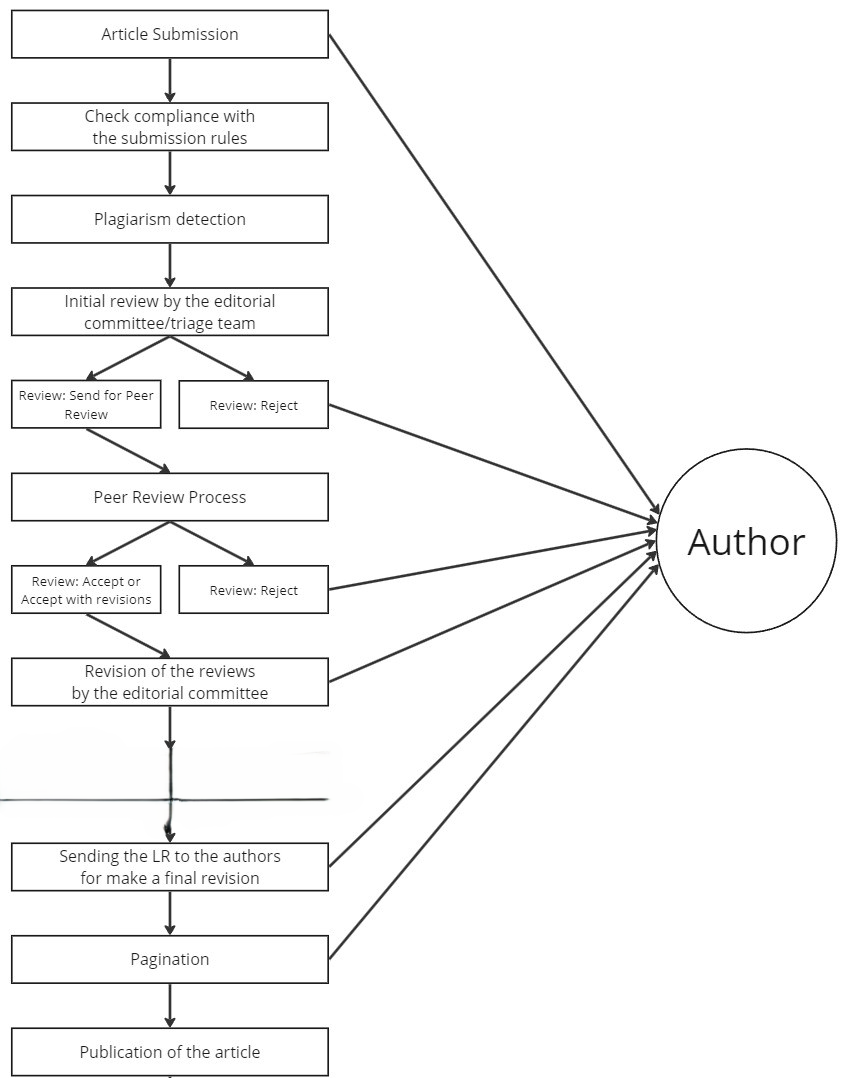About the Journal
Scope, objectives and publishing principles
The journal accepts the submission of manuscripts on empirically sustained research or texts of innovative theoretical reflection that contribute to the advancement of knowledge on areas related to Education.
In addition to the individually submitted manuscripts, accepts articles for open thematic issues.
The contents of the submitted manuscripts and the opinions expressed therein are the sole responsibility of their authors. However, texts with racist, sexist, xenophobic, homophobic or otherwise discriminatory content and language will not be accepted.
PERIODICITY
The journal is published on a continuous publishing.
Saber& Educar moved to a continuous publication model in 2023. This means that as soon as an article is ready to be published, it will be immediately released online rather than waiting for other articles in the issue to be completed, resulting in faster access to the final version of the article. In addition to the manuscripts submitted individually, SE launches a call for Thematic issues.
This journal checks for plagiarism
All papers submitted for publication will be submitted to a preliminary analysis. The content of the manuscripts is subject to detection of plagiarism. We check the plagiarism issue through two methods: reviewer check and plagiarism prevention tool. All submissions will be checked by plagiarism prevention software before being sent to reviewers. In case of suspicion of inappropriate conduct, the author (s) is / are contacted to clarify the questions or doubts raised. The text may or may not continue to be evaluated based on the result of this process.
Peer Review Process
All papers submitted for publication will be submitted to a preliminary analysis by the Journal’s Direction and Triage Team, who will apply the following suitability criteria:
a) respect for editorial policies and full compliance with submission conditions;
b) texts on education or that, in some way, incorporate relevant educational contributions;
c) structure and content of a scientific article;
d) non-discriminatory content and/or language.
Subject to these conditions, the content of the manuscripts is subject to detection of plagiarism. In case of suspicion of inappropriate conduct, the author (s) is / are contacted by the Board to clarify the questions or doubts raised. The text may or may not continue to be evaluated based on the result of this process, the Board is responsible for making this decision.
Compliant works will be evaluated on a double anonymous basis (double-blind review) by external experts. The evaluation criteria followed by the evaluators are as follows:
a) Originality and relevance;
b) Consistency in argumentation;
c) Theoretical and empirical basis;
d) Adequacy of methodological options;
e) Timeliness of the reference bibliography;
f) Clarity of the exhibition and organization;
g) Textual correction.
When there is a conflict in the reviews, a new review may be requested. The final decision is made by the editors.
The evaluation process usually takes between 6 months to 1 year. However, this period may vary depending on the complexity of the evaluations, the response of the evaluators and the nature of the modifications suggested and made. The dates of submission, acceptance and publication of each manuscript are indicated in the published article.
The editorial process is represented by the following flowchart:

Antiplagiarism Policy
All submitted articles are checked for plagiarism. Authors must ensure originality of articles and must mention and correctly cite all information from other publications. Plagiarism is unethical behaviour and is considered fraud.
Open Access Policy & Copyrights
This is an open access journal which means that all content is freely available without charge to the user or his/her
institution. Users are allowed to read, download, copy,
distribute, print, search, or link to the full texts of the articles,or use them for any other lawful purpose, without asking prior permission from the publisher or the author. This is in accordance with the Budapest Open Access Initiative (BOAI) definition of open access.
The author retains unrestricted copyrights and publishing rights.
This journal uses a CC BY-NC-SA license Attribution Non-Commercial Share Alike
Authors retain copyright and grant the journal right of first publication with the work simultaneously licensed under a Creative Commons Attribution License (BY-NC-SA 4.0) that allows others to share the work with an acknowledgement of the work's authorship and initial publication in this journal.
Authors are permitted and encouraged to post their work online (e.g., in institutional repositories or on their website) prior to and during the submission process, as it can lead to productive exchanges, as well as earlier and greater citation of published work (See The Effect of Open Access).

Archiving
The PKP Preservation Network (PN) provides preservation services for the journal. More...
Open access policy with:
Permanent article identifier:
Perfix doi:
10.25767 Datacite 10.17346 Crossref
APCS
This journal does not have article processing charges nor submission charges.
INDEXING
Indexing Bases
CAPES/ Qualis2017-2020 Educação B1 |Google Scholar Metrics (GSM) |InfoBase Index |Index Copernicus International |SJIF Journal Rank
Directories
Genamics JournalSeek | JournalTOCs | BASE | ROAD | Crossref|UCSB Library| Mir@bel| ERIHPLUS | Latindex |Datacite|DOAJ
Databases
Copac| SUDOC|MIAR | OAIster |RCAAP |OpenAire|Sherpa/Romeo
CODE OF ETHICS
Is applicated by SABER&EDUCAR Journal the Code of Conduct and Best Practice for Journal Editors of the Committee on Publication Ethics (COPE) and on the Code of Ethics of the American Educational Research Association (AERA). They follow 3 principles that are equally applied to editors, authors, and reviewers:
- Professional, Scientific, and Scholarly Responsibility;
- Integrity;
- Respect for People’s Human Rights, Dignity, and Diversity.Alongside Carta Ética – Instrumento de Regulação Ético-Deontológica (SPCE)
JOURNAL HISTORY
Created in 1994,the journal focuses on the field of Educational Sciences and is of academic and scientific nature. This journal began publishing in open access in 2009.
Saber & Educar publishes scholarly articles that explore significant ideas, issues, trends, policies and problems in education.
All research articles in Saber & Educar undergo peer review.
Publisher
Escola Superior de Educação de Paula Frassinetti, Portugal
e-ISSN 1647-2144
This is a new version of Open Journal Systems (OJS). Readers can access the archive (2009-2020) of the Journal.

